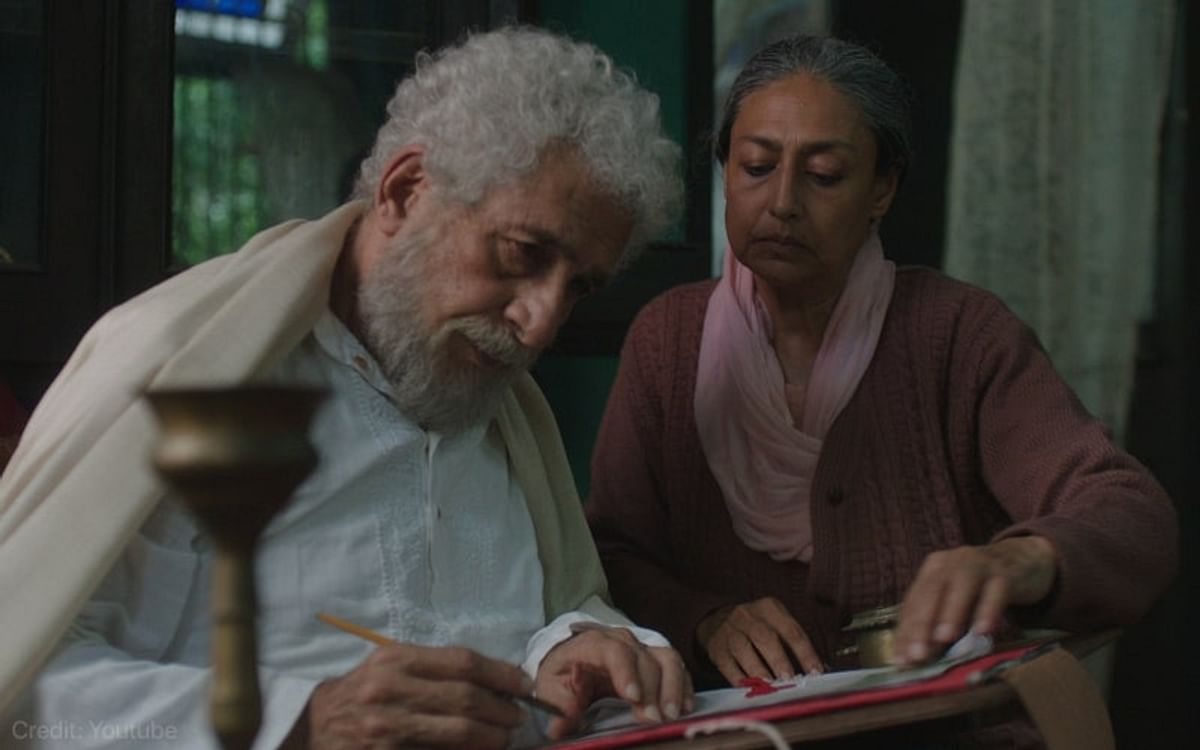By Sashi
Two years ago, in my interview of Naseeruddin Shah, he explained how he had cracked his character in Sparsh (1980) by stressing on the ears being the guiding body parts. One can see traits of that character in Kaushal Oza’s brilliant short The Miniaturist Of Junagadh. Although Husyn assures Noor that the loss of his eyesight is not a hindrance to his sensing of Noor’s tea but rather compensated for by his olfactory senses, it is actually Husyn’s ears that detects Noor’s arrival. In each scene, the actor cleverly uses his ears with subtle nuance.
Husyn disagrees with Sakina’s claims of the former having lost his eyesight to a life of making miniaturist paintings. He rectifies her to state that, in fact, a life of such dedication and meditative artistry has earned him this beautiful blindness. A life of working on the details of the world has transcended him beyond worldliness. He is blessed to not have to see this world anymore. Rather, humanity needs magnifying glasses to interpret the endless beauty coded in his work.
One registers the utmost respect he has for his own work. The lines he makes in his paintings are much greater than a meaningless Radcliffe Line that the British government draws.
I believe Husyn in The Miniaturist Of Junagadh (2021) to be a soul brother of Balraj Sahni’s character Salim Mirza in Garam Hawa (1973). The short does pay tribute to the former. One example is the rickshaw-puller scene in which Kishorilal ji arrives. In the 1973 film, a Hindu rickshaw puller overcharges Salim Mirza by asking him to go to Pakistan if he wants to travel at lower prices. In the short, the passenger, Kishorilal ji, underpays a Muslim rickshaw-puller, threatening the latter to be sent to Pakistan.
The voiceover dialogue by Rasika Dugal, trickily planted as a conversation that must have happened between Noor and Kishori off-screen, is a great device for exposition in the screenplay. But I, being a visual enthusiast, would have loved to watch something like this.
The film opens with a night scene. Sounds of miscreants can be heard at a distance. Noor and Sakina are seen handing over something to a visibly cold-hearted face (who appears to be a Hindu). We can’t see what they sell. We see Noor carrying a blank canvas from behind. She inserts it into one of the files. But we don’t clearly understand it. Later, we notice her guilt-ridden while doing other chores.
Maybe a scene comes later in the film where they sell the last painting and replace it with a blank canvas, the dialogues being written in a way that the whole backdrop gets inferred. Of course, such additions would have to be brought in with collateral changes to the existing screenplay.
In Garam Hawa, rather than leaving for Pakistan, Salim Mirza descends from the carriage to enter the huge mass rally that passes by him. His son, Sikander Mirza (played by Farooq Shaikh), is already a few steps ahead in the crowd. They have decided to fight for the rights of the the newly born ‘Hindustani Musalmaan’, who’s probably going to suffer consequences for decades ahead. Rather than leaving, they embrace their reality.
In Junagadh, Husyn and his family depart for the steamer from Porbander. He leaves behind a painting of Radha Krishna as an advance payment for his own ancestral house, which he intends to buy back once Jinnah and Patel resolve their political differences. It’s been 75 years since he left behind the last sip of his tea.
Although humans do their osmosis across the borders, the house cat is spared for not having any identity.
Do spot the ‘Special Thanks’ to Shama Zaidi ji (co-screenwriter of Garam Hawa) in the credits roll of The Miniaturist Of Junagadh.





